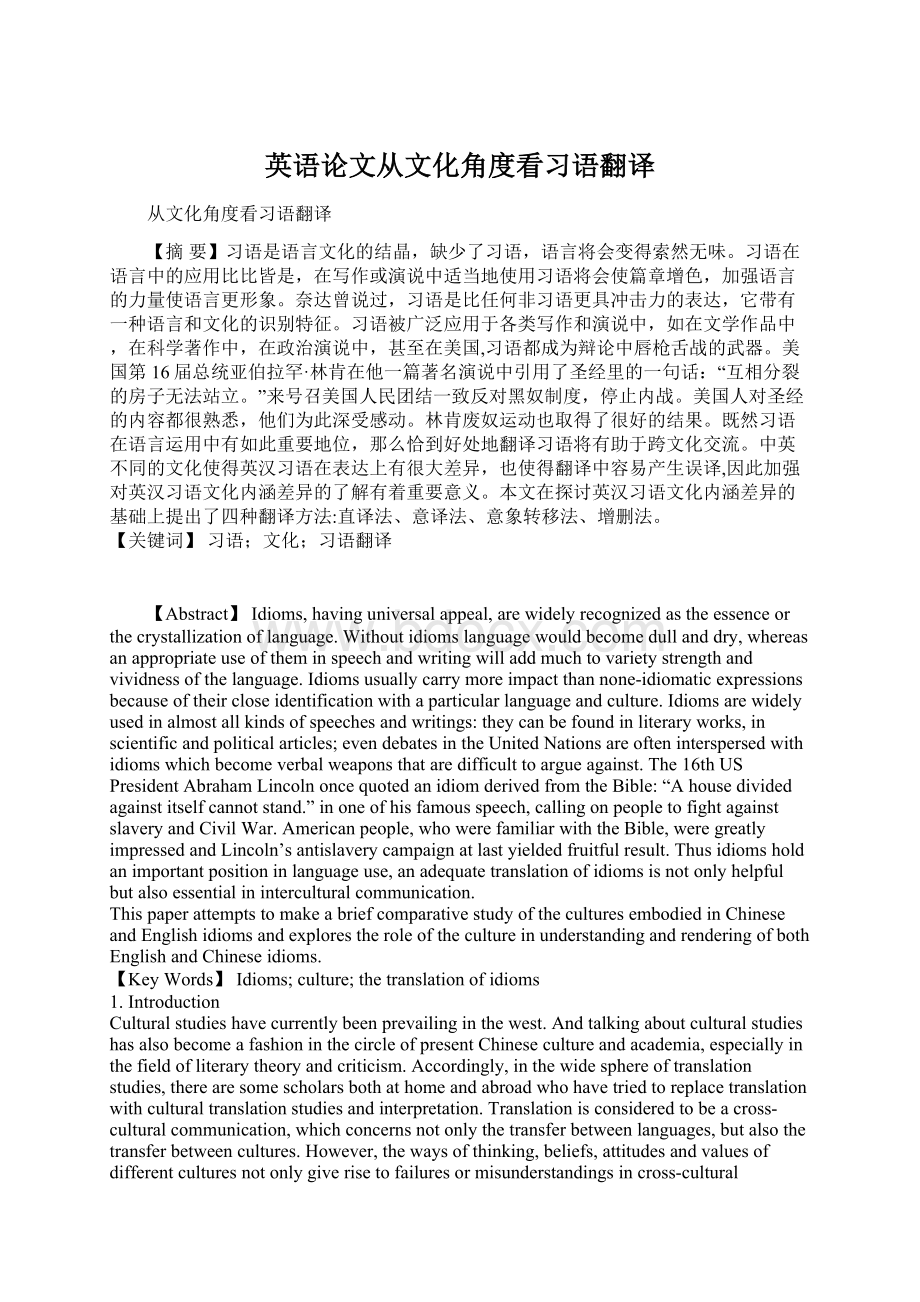英语论文从文化角度看习语翻译.docx
《英语论文从文化角度看习语翻译.docx》由会员分享,可在线阅读,更多相关《英语论文从文化角度看习语翻译.docx(12页珍藏版)》请在冰豆网上搜索。

英语论文从文化角度看习语翻译
从文化角度看习语翻译
【摘要】习语是语言文化的结晶,缺少了习语,语言将会变得索然无味。
习语在语言中的应用比比皆是,在写作或演说中适当地使用习语将会使篇章增色,加强语言的力量使语言更形象。
奈达曾说过,习语是比任何非习语更具冲击力的表达,它带有一种语言和文化的识别特征。
习语被广泛应用于各类写作和演说中,如在文学作品中,在科学著作中,在政治演说中,甚至在美国,习语都成为辩论中唇枪舌战的武器。
美国第16届总统亚伯拉罕·林肯在他一篇著名演说中引用了圣经里的一句话:
“互相分裂的房子无法站立。
”来号召美国人民团结一致反对黑奴制度,停止内战。
美国人对圣经的内容都很熟悉,他们为此深受感动。
林肯废奴运动也取得了很好的结果。
既然习语在语言运用中有如此重要地位,那么恰到好处地翻译习语将有助于跨文化交流。
中英不同的文化使得英汉习语在表达上有很大差异,也使得翻译中容易产生误译,因此加强对英汉习语文化内涵差异的了解有着重要意义。
本文在探讨英汉习语文化内涵差异的基础上提出了四种翻译方法:
直译法、意译法、意象转移法、增删法。
【关键词】习语;文化;习语翻译
【Abstract】Idioms,havinguniversalappeal,arewidelyrecognizedastheessenceorthecrystallizationoflanguage.Withoutidiomslanguagewouldbecomedullanddry,whereasanappropriateuseoftheminspeechandwritingwilladdmuchtovarietystrengthandvividnessofthelanguage.Idiomsusuallycarrymoreimpactthannone-idiomaticexpressionsbecauseoftheircloseidentificationwithaparticularlanguageandculture.Idiomsarewidelyusedinalmostallkindsofspeechesandwritings:
theycanbefoundinliteraryworks,inscientificandpoliticalarticles;evendebatesintheUnitedNationsareofteninterspersedwithidiomswhichbecomeverbalweaponsthataredifficulttoargueagainst.The16thUSPresidentAbrahamLincolnoncequotedanidiomderivedfromtheBible:
“Ahousedividedagainstitselfcannotstand.”inoneofhisfamousspeech,callingonpeopletofightagainstslaveryandCivilWar.Americanpeople,whowerefamiliarwiththeBible,weregreatlyimpressedandLincoln’santislaverycampaignatlastyieldedfruitfulresult.Thusidiomsholdanimportantpositioninlanguageuse,anadequatetranslationofidiomsisnotonlyhelpfulbutalsoessentialininterculturalcommunication.
ThispaperattemptstomakeabriefcomparativestudyoftheculturesembodiedinChineseandEnglishidiomsandexplorestheroleofthecultureinunderstandingandrenderingofbothEnglishandChineseidioms.
【KeyWords】Idioms;culture;thetranslationofidioms
1.Introduction
Culturalstudieshavecurrentlybeenprevailinginthewest.AndtalkingaboutculturalstudieshasalsobecomeafashioninthecircleofpresentChinesecultureandacademia,especiallyinthefieldofliterarytheoryandcriticism.Accordingly,inthewidesphereoftranslationstudies,therearesomescholarsbothathomeandabroadwhohavetriedtoreplacetranslationwithculturaltranslationstudiesandinterpretation.Translationisconsideredtobeacross-culturalcommunication,whichconcernsnotonlythetransferbetweenlanguages,butalsothetransferbetweencultures.However,thewaysofthinking,beliefs,attitudesandvaluesofdifferentculturesnotonlygiverisetofailuresormisunderstandingsincross-culturalcommunicationbutalsoposeheadachestotranslationtheoristsandtranslators.
Anidiomisabeautifulgemofalanguageaswellascrystallizationofnationalculture.Yetitisalsooneofthemostdifficultthingstolearnanduseinaforeignlanguage.Theyareoftenratherhardtounderstandfromthemeaningofindividualwords.ChineseandEnglishbothaboundwithidioms,whosesuccinctformsandprofoundmeaningsmakethemselvesmorecondensedandexpressive.Manyidiomsbearfiguresandstrongculturalflavors.Iftheyaretranslatedappropriately,notonlycantheoriginalspiritandmeaningsbefaithfullyconveyed,clearlyunderstoodandacceptedbythetargetlanguagereaders,butalsotheChineseandEnglishvocabulariescanbeenrichedtoprovideabroaderculturalvision.Theissuesofrenderingidiomsofonelanguageintoanotherarealwayscomplicated,ifthetwolanguagesinvolvedaresounlikeinbackgroundsandcultureswitheachother.Thispaperexpoundsthecloserelationshipbetweenidiomsandculturetranslation,andtheissueofidiomtranslationisexploredfromaculturalperspective.
2.Definitionsandformsofidiom
2.1Thedefinitionsofidiom
Theword“idiom”possessesseveralmeanings.Itmaybedefinedas“thelanguageofapeopleoracountry”,asin“theChineseidiom”;or“adialect”asin“Cantoneseidiom”.Itmayalsobedefined,accordingtoOxfordAdvancedLearner’sEnglish-ChineseDictionary,as“phraseorsentencewhosemeaningisnotclearfromthemeaningofitsindividualwordsandwhichmustbelearntasawholeunit”[1]p734.Theseconddefinitionmostsuitsthepurposeofthispaper.TheChinese“equivalent”for“idiom”is“习语”,italsoreferstoakindofasetphraseorsentencefixedbylongusage.Fromtheabovedefinitionswecanextracttwobasiccriteriaonwhichtodecidewhetherornotanexpressionisanidiom(or:
习语):
Firstly,establishedandrefinedbylongpracticaluse,anidiomhasarelativelyhighdegreeofstabilityofthelexicalcomponents.Anidiomallowslittleornovariationinformundernormalcircumstances.Ingeneral,anychangeinthecomponentswillresultinabsurditiesorevenrendertheidiomsmeaningless.Aspeakerorwritercannotnormallydoanyofthefollowingwithanidiomunlessheorsheisconsciouslymakingajokeorattemptingplayonwords:
a.Changetheorderofthewordsinit(e.g.*“atsevensandsixes”insteadof“atsixesandsevens”);
b.Deleteawordfromit(e.g.*“akettleoffish”insteadof“anicekettleoffish”);
c.Addawordtoit(e.g.*“toshowone’swhiteteeth”insteadof“toshowone’steeth”);
d.Replaceawordwithanother(evenwithasynonymousword)(e.g.*“thepearofone’seye”insteadof“theappleofone’seye”)
e.Changeitsgrammaticalstructure(e.g.*“akingmaybelookedatbyacat”insteadof“acatmaylookataking”).
SimilarlyinChinesewecanonlysay:
“七零八落”not“八零七落;”“无的放矢”not“无的放箭”,although“矢”and“箭”bothmean“arrow”.However,justaswhathasbeenmentionedabove,sometimes,eitherforthesakeofsarcasmorforthesenseofhumororforthesakeofstyle,wecancreate,asamakeshift,someirregularvariantsfromtheoriginalidioms,buttheseirregularvariantsaretransient,andmaynotbeacknowledgedbypeopleasawhole:
(1)“toreadmorethanonecanchew”isfrom“tobiteoffmorethanonecanchew”;
(2)“bedressedtotheteeth”isfrom“tobearmedtotheteeth”.
SimilarlyinChinese:
(3)“一箭三雕”(toshootthreehawkswithonearrow)isanirregularvariantofthesetphrase“一箭双雕”(toshoottwohawkswithonearrow);
(4) “权令智昏”(tobeblindedbylustforpower)from“利令智昏”(tobeblindedbylustforgain);
Sometimesforrhetoricaleffect,anidiomcanbemadebriefwithonlythecoreelementremained:
(5) Thehotelwasexpensive,thefoodwaspoorandthebadweatherwasthelaststraw.
Inthissentence,“thelaststraw”isadaptedfromtheidiom“Itisthelaststrawthatbreaksthecamel’sback.”
(6) Makehay.Themarketisgoodnowdon’tmissthechance.
Here,“makehay”isabbreviatedfromtheidiom“Makehaywhilethesunshines”.Suchadaptationusuallycallsforthefamiliarityoftheidiombythereadertorecognizetherealmeaning.
Secondly,anidiomoftencarriesmeanings,whichcannotbededucedfromtheirindividualcomponents.Moreoftenthannot,itcannotbeinterpretedonlyaccordingtoitsliteralmeaning.Taketheexpression“togoDutch(withsomeone)”forexample:
InsteadofgoingtotheNetherlands(Holland),itmeanstoagreetosharethecostofsomething(withsomeone),asin“Willyouletmetakeyououttodinnertonight?
“AslongaswegoDutch”.TakeanotherChineseidiomforexample:
“胸有成竹”(literallymeanstohavethebambooinone’smind,figuratively,tohavereadyplansordesigninone’smind.cf.tohaveacardupone’ssleeve).Anidiomusuallyacquiresanimpliedmeaning,thatistosay,mostidiomsaremetaphoricalinmeaning.Themeaningofanidiomissomewhatmorethanthesummeaningsofitsconstituentwords,inotherwords,idiomsconveymoremeaningasawholethanthefewwordscouldcarryseparately.Thiscanbefullyillustratedbythefollowingexamples:
whentakenliterary,thephrase“themaninthestreet”isnotanidiom.Inafigurativesense,“themaninthestreet”impliestheaverageperson,whorepresentsgeneralopinion.Whensomeonesays,“Youcannotunscramblethescrambledegg”,heisnotmerelyreferringtotheegg,andheisusingametaphortotellanotherpersonnottoworryaboutsomethingthatcannotbeundone.“Cat’spaw”doesnotrefertothepawofacatbutapersonwhohasbeenfooledorexploited.“Blacksheep”isnotasheepwhichisblackatall.Anditmeansanevilmemberofaherdoragood-for-nothingperson.
2.2Formsofidioms
Inabroadsense,idiomaticphrasescoverallofthefollowingforms:
setphrases,proverbs,commonsayings,colloquialisms,allusionsandslangs.Herefourimportantformsofidiomsareselectedforexplanation.
2.2.1Setphrases
Onemostimportantgroupofidiomsaresetphraseswhoseformissetandmanyofthemareratherrigidandcannotshowupinanyotherforms.ThereisaninexhaustiblestorehouseofsetphrasesthatplayanimportantroleinEnglishlanguage.Ishallselectoneofthemwithculturaltraces.Forexample,theoriginof“tokickthebucket”canbetracedbacktoareligiousceremonyofbaptisminChristianity.AsfarasaChristianisconcerned,his/herimportantthreestages,birth,marriageanddeath,arecloselyconnectedwithareligiousceremony:
baptism.AChristianneedstoreceivebaptismfromanadministratorwhenhe/shewasborn,getmarriedinthechurchwithblessingsofacertainministerandbebaptizedagainwhenhe/sheisgoingtodie”.Sotheidiom“kickthebucket”isaeuphemisticexpressionconnoting“todie”referringtothedeathofaChristianintheceremonyofbeingbaptized.
2.2.2Allusions
Allusionsofidiomsareactuallyoriginsandnationalcharacteristicsofidioms.Onaccountofthedifferentsocialbackground,customsandreligious,someidiomsares